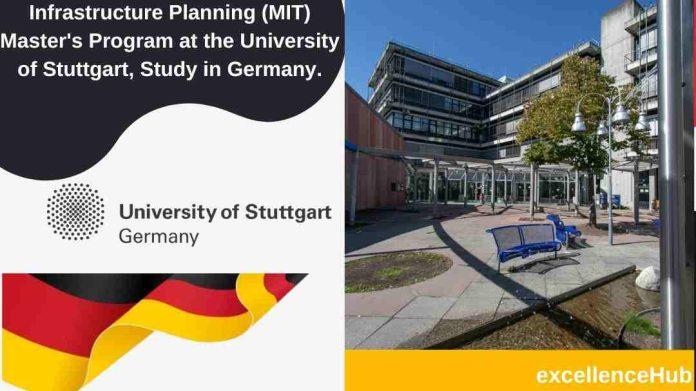Scholarship Description:
What is involved in the Infrastructure Planning (MIP) Master’s Program? Any country’s ability to develop effectively depends on its carefully planned infrastructure network. On a global scale, there is an urgent need for qualified experts to lead the planning, organizing, and execution of infrastructure projects related to waste management, water management, and transportation. At both the urban and regional levels, this entails a thorough integration of managerial, social, ecological, and economic factors. Master’s Program at the University of Stuttgart.
The highly respected Master of Science program in infrastructure planning, which has been offered by the University of Stuttgart, has been operating successfully since 1983. This curriculum takes an internationally recognized approach to planning by bringing together experts in civil engineering with persons who have backgrounds in architecture or urban planning from their undergraduate studies. Through the development of an integrated viewpoint, the curriculum not only provides technical knowledge but also gives students the ability to plan, evaluate, analyze, and carry out complex large-scale infrastructure projects that are appropriate for the problems of the twenty-first century.
About the Program:
The MIP program is an extensive two-year Master of Science (M.Sc.) study taught in English with an emphasis on learning through research. A significant percentage of the modules in the program are directly derived from the ongoing research endeavours of the collaborating institutes, thereby guaranteeing the incorporation of the most recent research findings into the instructional structure. Students gain the ability to work both individually and in groups while exploring a variety of developmental topics related to different research facilities at the University of Stuttgart.
Expert faculty members from various institutes and seasoned professionals share their ideas in classes that average about 35 students. A great deal of attention is paid to developing an interdisciplinary perspective in a cross-cultural setting, which is an invaluable resource for modern infrastructure planners working on large-scale, complex projects—particularly those involving international joint ventures.
Also check: Employment Agencies in New Zealand for International Workers| 2024|
Details of Master’s Program at the University of Stuttgart
The MIP curriculum instills a solid foundation and grasp of several pivotal aspects of Infrastructure planning includes transportation networks, energy distribution, urban development, hydraulic engineering, regional planning, economics, ecology, and social aspects of spatial planning. Along with gaining a solid understanding of these fields, participants also learn how to recognize the relevant scientific and engineering settings for them. They get knowledge on how to conceptualize spatial planning methods at different levels and are prepared to evaluate and implement these strategies using the proper technical interventions.
Students are further equipped by the curriculum to recognize, understand, and evaluate the difficulties presented by infrastructure projects as well as to conduct the necessary analytical, model-driven, and experimental research. In addition, participants get the engineering skills necessary to plan, organize, and oversee infrastructure projects while understanding the social, political, and economic ramifications of such undertakings.
Additionally, the program provides the skills required to successfully traverse the administrative and organizational facets of putting infrastructure plans into action. In the end, the MIP curriculum develops specialized and multidisciplinary competencies, enabling learners to create original solutions to problems on their own. They gain the ability to locate, appraise, analyze, and critically evaluate the necessary data and to successfully translate these findings into solutions that are suited to the unique circumstances of their respective nations.
Degree Level:
Infrastructure Planning (MIT) Master’s Program at University of Stuttgart: Enroll in master’s level courses at University of Stuttgart. Study in Germany. Subjects Available: Under this scholarship program, you can study any of the following subjects.
Infrastructure Planning Scholarship Benefits:
Post-Program Career Opportunities:
Graduates of the program will be in a position to strategically contribute to the creation of comprehensive, resilient, and ecologically sustainable infrastructure projects after they have finished the program. Among the many possible career paths are positions as a private sector infrastructure planner, consultant, civil servant in charge of various aspects of regional or national infrastructure planning, and decision-makers in policy and planning. With a broad range of abilities, graduates will be able to direct and coordinate the work of multinational, interdisciplinary expert teams in a variety of infrastructure-related fields.
Applicants are urged to apply for financial aid if they are unable to pay for their education on their own. Both German and foreign institutions, as well as institutions in the applicants’ home countries, provide a variety of opportunities. You can find a list of possible institutions or organizations by clicking this link.
Note:
The University of Stuttgart’s Master of Infrastructure Planning Program is not connected to the organizations or institutions listed in the provided link, and therefore has no control over or assurance of scholarships from such groups or establishments. It’s crucial that applicants realize that although if the program is unique, they can independently look into scholarship options offered by the many institutions and organizations listed above, as well as by other possible sources.
In addition to applying to the University of Stuttgart’s Master’s program, candidates need adhere to the application procedures and requirements established by those organizations.
All international students are welcome to apply to this program, regardless of their nationality.
Eligibility Criteria:
Who ought to submit an application? The MIP program is designed for professionals or students specializing in civil engineering, architecture, and urban planning, as well as graduates of related fields of study, who want to prepare for challenging planning tasks that require global exposure and insight into infrastructure planning in a broad, integrated context.
How to Apply:
The University of Stuttgart’s “C@MPUS” application system is where the application must be submitted online. Applications that are complete and have accurately uploaded documentation will only be reviewed.
ONLINE APPLICATION
MIP online applications will be accepted on the University of Stuttgart’s C@MPUS site from August 1st of the year before to the start of studies until February 15th of the year of study commencement.


